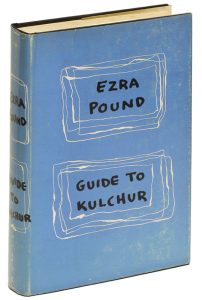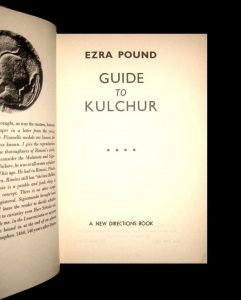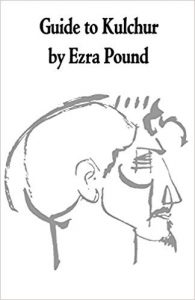Masterpieces of Aryan Thought 4
Ezra Pound’s Guide to Kulchur
Quintilian
Ezra Pound’s Guide to Kulchur (1938) is one of those unfortunate great books (think Spengler’s Decline of the West and any book by Henry Adams) that is often mentioned but seldom read. The book was meant as a guide to the essential philosophy, art, economics, history, and ethics from Confucius to the 20th century as uniquely interpreted by Pound.
This and the ABC of Reading (1934) constituted the core texts of the “Ezra-versity,” the informal seminars that Pound held before World War II for those acolytes who came to visit him in Rapallo, Italy.
The book is dedicated to two of these acolytes and “graduates” of the Ezra-versity: the British poet Basil Bunting (1900–1985), author of Briggflatts; and the American Jewish poet Louis Zukofsky (1904–1978) whose monumental long poem “A” is the only work comparable in scope and complexity to Pound’s own Cantos.
Guide to Kulchur is unique in both its structure and style. Written in Pound’s folksy demotic English that at times seems more akin to Mark Twain or Joel Chandler Harris, the book is arranged in a series of very short chapters that seem to unfold in a haphazard fashion. The book’s form only becomes manifest the longer one reads, and by the end of the book one is amazed at how Pound has managed to weave seamlessly the many strands of Western and ancient Chinese thought.
 For Pound, philosophy and ethics begin with Confucius, particularly the Confucian idea that a well-ordered and moral society is based upon the imperative to call things by their correct names. This may seem like a minor point upon which to build a civilizational edifice, but it is, in reality, nothing less than a commitment to truth telling, a commitment that is sorely at odds with our own postmodern age that has abandoned the search for truth as a sine qua non. For Pound, the commitment to truth telling extends not only to philosophy and the arts but also to economics. His unique and highly critical take on the ancient Greek philosophers (especially Aristotle) stems in no little part, as he sees it, from their inability to conceive of money as other than a means of measurement without a basis in morality. Pound viewed the ancient Greeks as “happy men with no moral fervor”[1] who represented a decline from the seriousness of their Homeric era ancestors.
For Pound, philosophy and ethics begin with Confucius, particularly the Confucian idea that a well-ordered and moral society is based upon the imperative to call things by their correct names. This may seem like a minor point upon which to build a civilizational edifice, but it is, in reality, nothing less than a commitment to truth telling, a commitment that is sorely at odds with our own postmodern age that has abandoned the search for truth as a sine qua non. For Pound, the commitment to truth telling extends not only to philosophy and the arts but also to economics. His unique and highly critical take on the ancient Greek philosophers (especially Aristotle) stems in no little part, as he sees it, from their inability to conceive of money as other than a means of measurement without a basis in morality. Pound viewed the ancient Greeks as “happy men with no moral fervor”[1] who represented a decline from the seriousness of their Homeric era ancestors.
While Pound’s embrace of Social Credit economics and strong denunciation of usury are well known, the Guide to Kulchur reveals how closely Pound linked together economics and aesthetics. In the very remarkable Chapter 50, entitled “Chaucer Was Framed,” Pound states:
Usury is contra naturam. It is not merely opposition to nature’s
increase, it is antithetic to discrimination by the senses. Discrimination
by the senses is dangerous to avarice. It is dangerous because any
perception or any high development of the perceptive faculties may
lead to knowledge. The moneychanger only thrives on ignorance.
He thrives on all sorts of insensitivity and non-perception.
An instant sense of proportion imperils financiers.[2]
 Pound’s insights are as remarkable as they are prescient. An imperiled aesthetic sense that is incapable of discerning differences of quality and meaning and that cannot sense subtleties of emotion is necessary for a complacent body of fungible consumers who, in the words of Oscar Wilde, “know the price of everything and the value of nothing.”
Pound’s insights are as remarkable as they are prescient. An imperiled aesthetic sense that is incapable of discerning differences of quality and meaning and that cannot sense subtleties of emotion is necessary for a complacent body of fungible consumers who, in the words of Oscar Wilde, “know the price of everything and the value of nothing.”
Pound, who viewed the Medieval Church as the highest expression of Western Civilization, likewise saw Calvinist Protestantism as its lowest expression, one that permitted, indeed glorified, usury and the inability to make aesthetic and moral distinctions:
You can, by contrast, always get financial backing for
debauchery. Any form of “entertainment” that debases perception,
that profanes the mysteries or tends to obscure discrimination, goes
hand in hand with drives toward money profit.
It might not be too much to say that the whole of protestant
morals, intertwined with usury-tolerance, has for centuries tended
to obscure perception of degrees, to debase the word moral to a
single groove, to degrade all moral perceptions outside the relation
of the sexes, and to vulgarize the sex relation itself.[3]
What is remarkable here is that Pound was able to see through the practices and goals of the leftist globalists at precisely the time that the right-wing nationalists were at the zenith of their power. These two paragraphs of Pound’s explain why the globalists use pornography as a means to normalize sexual perversions in order to subvert white family formation. They also explain the bread-and-circus nature of the global financiers to keep consumers satiated with cheap toys and gadgets. And finally, Pound was able to ascertain that Calvinist morality has led to an inability of our enemies to be able to make moral distinctions, wherein any disagreement with a leftist, however minor, becomes an example of “hate speech” in which the speaker literally becomes Adolf Hitler. It is also amazing that Pound saw the origin of leftist ideology in Calvinism, and as such, antedates by more than half a century the same conclusion brought by the Neoreactionaries, especially Curtis Yarvin a/k/a Mencius Moldbug.
Pound is a demanding author. He does not suffer fools gladly and he expects his readers to do their homework, but the rewards are many for those readers who are up to the challenge. Guide to Kulchur should be an essential book in the library of every white nationalist. Although written 80 years ago, the book is even more relevant today than it was when it was written, for in the words of its author:
Liberalism is a running sore, and its surviving proponents
are vile beyond printable descriptions. They have betrayed the “Droits
de l’homme”, they are more dastardly than Judas . . . .
In our time the liberal has asked for almost no freedom save
the freedom to commit acts contrary to the general good.[4]
I rest my case.
Notes
[1] Ezra Pound, Guide to Kulchur (New York: New Directions, 1970 [1938]), p. 330.
[2] Ibid., p. 281.
[3] Ibid., pp. 281–82.
[4] Ibid., p. 254.
Masterpieces%20of%20Aryan%20Thought%204%20Ezra%20Pound%E2%80%99s%20Guide%20to%20Kulchur
Enjoyed this article?
Be the first to leave a tip in the jar!
Related
-
Doxed: The Political Lynching of a Southern Cop
-
James M. McPherson’s Battle Cry of Freedom, Part 2
-
James M. McPherson’s Battle Cry of Freedom, Part 1
-
National Socialism as a Magical Movement: Stephen E. Flowers’ The Occult in National Socialism
-
Communist Barbarism in Hungary — and America Today: When Israel Is King
-
Introducing a Reactionary Aphorist
-
The Establishment’s Radicals
-
Identité Blanche de Jared Taylor

1 comment
“is also amazing that Pound saw the origin of leftist ideology in Calvinism, and as such, antedates by more than half a century the same conclusion brought by the Neoreactionaries,”
I wouldn’t call Pound “prescient”, or at least especially so, since he seems to draw pretty heavily from Max Weber’s theory on the origins of capitalism in Protestant morals. Although the latter doesn’t articulate it as clearly, he does decry that material worth came to displace higher, more abstract values in his contemporary, turn of the century society.
“especially Curtis Yarvin a/k/a Mencius Moldbug.”
While I do understand that Moldbug is especially fixated on this, he is far from being the first Reactionary writer (I pause to call him “thinker”) to place the roots of modern American liberalism in the Calvinist ethos. Paul Gottfried comes readily to mind, who did so some 20 years in advance.
I admit, I haven’t read all of Yarvin’s work, but what I did seemed to me derivative, with only an appearance of originality due mostly to his habit of not crediting any of his modern influences (assuming he didn’t re-invent the wheel…). This is a huge no-no for any serious humanities grad student and above, as it can deceitfully give the aura of a “thinker” to a mere popularizer. It’s little surprise his influence almost exclusively extends to poorly read computer programmers…
Again, I have only cursory knowledge of Yarvin’s writings, I’d appreciate a defense of the guy from someone more familiar with him.
Comments are closed.
If you have Paywall access,
simply login first to see your comment auto-approved.
Note on comments privacy & moderation
Your email is never published nor shared.
Comments are moderated. If you don't see your comment, please be patient. If approved, it will appear here soon. Do not post your comment a second time.